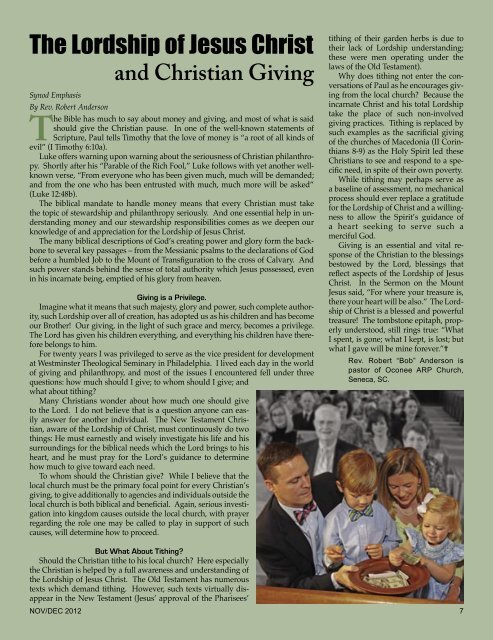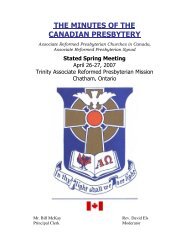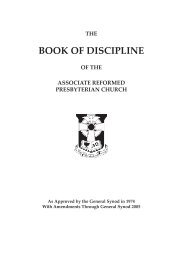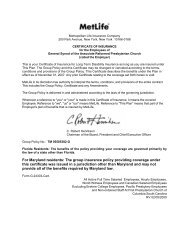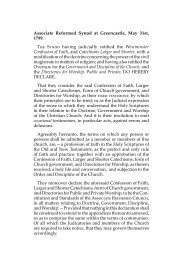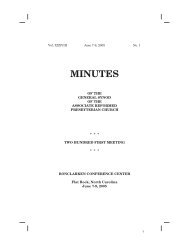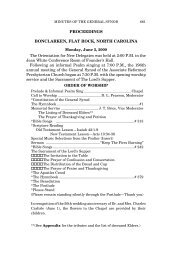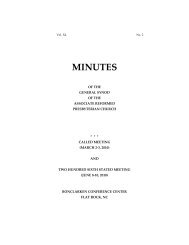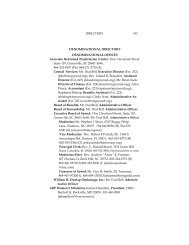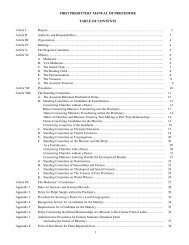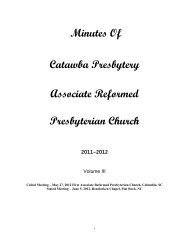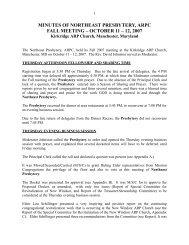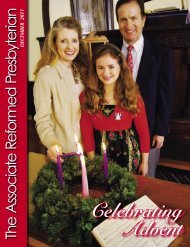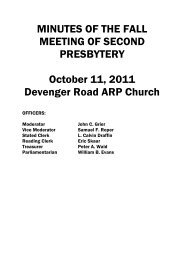the associate reformed presbyterian
the associate reformed presbyterian
the associate reformed presbyterian
- No tags were found...
Create successful ePaper yourself
Turn your PDF publications into a flip-book with our unique Google optimized e-Paper software.
The Lordship of Jesus Christand Christian GivingSynod EmphasisBy Rev. Robert AndersonThe Bible has much to say about money and giving, and most of what is saidshould give <strong>the</strong> Christian pause. In one of <strong>the</strong> well-known statements ofScripture, Paul tells Timothy that <strong>the</strong> love of money is “a root of all kinds ofevil” (I Timothy 6:10a).Luke offers warning upon warning about <strong>the</strong> seriousness of Christian philanthropy.Shortly after his “Parable of <strong>the</strong> Rich Fool,” Luke follows with yet ano<strong>the</strong>r wellknownverse, “From everyone who has been given much, much will be demanded;and from <strong>the</strong> one who has been entrusted with much, much more will be asked”(Luke 12:48b).The biblical mandate to handle money means that every Christian must take<strong>the</strong> topic of stewardship and philanthropy seriously. And one essential help in understandingmoney and our stewardship responsibilities comes as we deepen ourknowledge of and appreciation for <strong>the</strong> Lordship of Jesus Christ.The many biblical descriptions of God’s creating power and glory form <strong>the</strong> backboneto several key passages – from <strong>the</strong> Messianic psalms to <strong>the</strong> declarations of Godbefore a humbled Job to <strong>the</strong> Mount of Transfiguration to <strong>the</strong> cross of Calvary. Andsuch power stands behind <strong>the</strong> sense of total authority which Jesus possessed, evenin his incarnate being, emptied of his glory from heaven.Giving is a Privilege.Imagine what it means that such majesty, glory and power, such complete authority,such Lordship over all of creation, has adopted us as his children and has becomeour Bro<strong>the</strong>r! Our giving, in <strong>the</strong> light of such grace and mercy, becomes a privilege.The Lord has given his children everything, and everything his children have <strong>the</strong>reforebelongs to him.For twenty years I was privileged to serve as <strong>the</strong> vice president for developmentat Westminster Theological Seminary in Philadelphia. I lived each day in <strong>the</strong> worldof giving and philanthropy, and most of <strong>the</strong> issues I encountered fell under threequestions: how much should I give; to whom should I give; andwhat about tithing?Many Christians wonder about how much one should giveto <strong>the</strong> Lord. I do not believe that is a question anyone can easilyanswer for ano<strong>the</strong>r individual. The New Testament Christian,aware of <strong>the</strong> Lordship of Christ, must continuously do twothings: He must earnestly and wisely investigate his life and hissurroundings for <strong>the</strong> biblical needs which <strong>the</strong> Lord brings to hisheart, and he must pray for <strong>the</strong> Lord’s guidance to determinehow much to give toward each need.To whom should <strong>the</strong> Christian give? While I believe that <strong>the</strong>local church must be <strong>the</strong> primary focal point for every Christian’sgiving, to give additionally to agencies and individuals outside <strong>the</strong>local church is both biblical and beneficial. Again, serious investigationinto kingdom causes outside <strong>the</strong> local church, with prayerregarding <strong>the</strong> role one may be called to play in support of suchcauses, will determine how to proceed.tithing of <strong>the</strong>ir garden herbs is due to<strong>the</strong>ir lack of Lordship understanding;<strong>the</strong>se were men operating under <strong>the</strong>laws of <strong>the</strong> Old Testament).Why does tithing not enter <strong>the</strong> conversationsof Paul as he encourages givingfrom <strong>the</strong> local church? Because <strong>the</strong>incarnate Christ and his total Lordshiptake <strong>the</strong> place of such non-involvedgiving practices. Tithing is replaced bysuch examples as <strong>the</strong> sacrificial givingof <strong>the</strong> churches of Macedonia (II Corinthians8-9) as <strong>the</strong> Holy Spirit led <strong>the</strong>seChristians to see and respond to a specificneed, in spite of <strong>the</strong>ir own poverty.While tithing may perhaps serve asa baseline of assessment, no mechanicalprocess should ever replace a gratitudefor <strong>the</strong> Lordship of Christ and a willingnessto allow <strong>the</strong> Spirit’s guidance ofa heart seeking to serve such amerciful God.Giving is an essential and vital responseof <strong>the</strong> Christian to <strong>the</strong> blessingsbestowed by <strong>the</strong> Lord, blessings thatreflect aspects of <strong>the</strong> Lordship of JesusChrist. In <strong>the</strong> Sermon on <strong>the</strong> MountJesus said, “For where your treasure is,<strong>the</strong>re your heart will be also.” The Lordshipof Christ is a blessed and powerfultreasure! The tombstone epitaph, properlyunderstood, still rings true: “WhatI spent, is gone; what I kept, is lost; butwhat I gave will be mine forever.”?Rev. Robert “Bob” Anderson ispastor of Oconee ARP Church,Seneca, SC.But What About Tithing?Should <strong>the</strong> Christian ti<strong>the</strong> to his local church? Here especially<strong>the</strong> Christian is helped by a full awareness and understanding of<strong>the</strong> Lordship of Jesus Christ. The Old Testament has numeroustexts which demand tithing. However, such texts virtually disappearin <strong>the</strong> New Testament (Jesus’ approval of <strong>the</strong> Pharisees’NOV/DEC 2012 7


